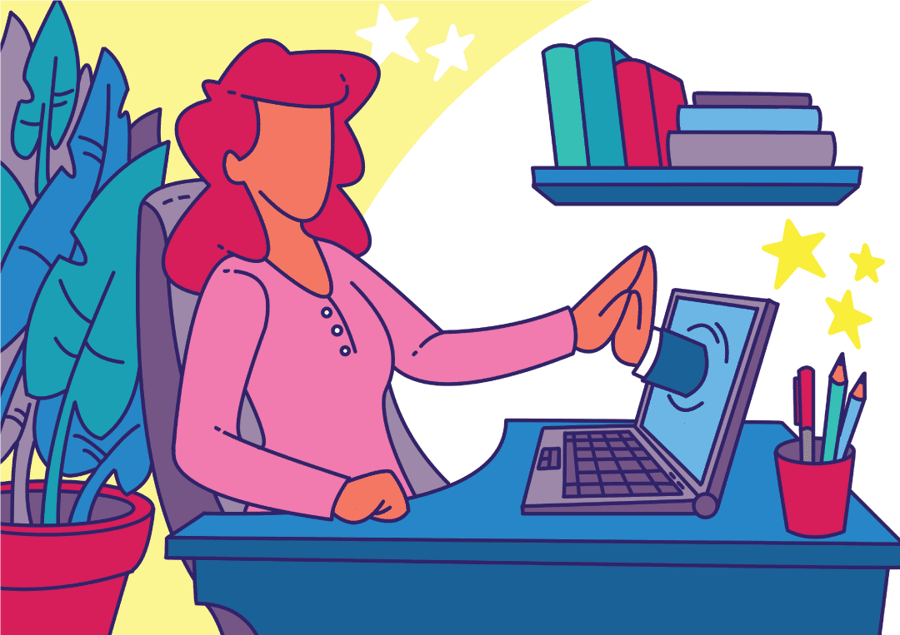SECTION
How to Practice Empathy in Times of Social Distancing

Listen to this article:
Let’s begin our quest for empathy and its role in the workplace with an exercise in imagination. During an online meeting, Sam, team leader, decides to initiate an “icebreaker”.
All team members are working remotely and are just getting to know each other, so Sam proposes a simple game, encouraging everyone to tell the story of how they got their first names.
It all starts well, colleagues show themselves willing to participate.
However, Mark, a senior colleague, says that he does not want to make friends at work, he just wants to do his job and then focus on his friends and family. This creates a slight disruption during the meeting. What would you do in such a situation?
How would you convince Mark that our work interactions can have a great impact on how well we perform? They can make it easier or harder. And this is where empathy comes into play.
Why we need empathy in the work environment
The term “empathy” is used to refer to a wide range of experiences. Emotion researchers generally define empathy as the ability to sense other people’s emotions, together with the ability to imagine what someone else might be thinking or feeling.
Let’s see how this can impact the work environment, which some colleagues may regard as “just a place where we do our jobs.”
We asked Diana Dragu and Iulia Zamfir, organizational consultants at Gordon Training, for their opinion on empathy in the professional context. They said that “understanding other people’s emotions is an essential skill in the workplace. It can help us improve our relationships with co-workers and clients. According to psychologist Daniel Goleman, empathy is one of the five key components of emotional intelligence, and it’s a vital leadership skill.”
As Diana and Iulia continue, there are two types of empathy, cognitive and emotional. While the first one seems to belong more in the workplace, it is actually the latter that can make a real difference.
“We can talk about cognitive empathy as the ability to understand what other people might be thinking or feeling, and it doesn’t involve any emotional attuning. It is a rational ability. But emotional empathy is the ability to feel with people, to be able to understand the other on a deeper level, and this is the kind of empathy that we need to foster in our organizations.”
How to show empathy at work and use it effectively
In the current pandemic context, the most important advice that people can try to follow is to “look at this period as a pause, a moment when they can re-evaluate how they do things”, Diana Dragu and Iulia Zamfir determine. Empathy can be one of those things.
What we could do now, as interactions take place mostly online is to “start by looking at things from the other person’s point of view, trying to understand their perspective as their truth. It is important to receive what the other says without judging him/her”, note the two organizational consultants, emphasizing that working remotely with no video input makes things even harder. “The body language gives us clues on the intentions of the other person and without it, we are prone to making assumptions and seeing bad intentions where there are none.”
Ionuț Cociaș and Sorina Curtașu, certified coaches at Zitec, make similar comments concerning the need to see one’s interlocutor during video calls. “When working from home, both as a coach and manager, it is very difficult to connect to other people's emotions, especially if they have their camera turned off. When you have the camera on, there is still a chance that you can see some emotions, but you would have to be a champion observer for that”, mentions Ionuț. He makes a very important point, by adding that improving one’s listening abilities is very useful during such times. “I have learned to identify emotions by voice. And it is not an easy task, but it can be developed if we pay more attention to our interlocutors.”
On the other hand, Sorina highlights another noteworthy aspect, emphasizing why we should bring into our professional discussions other topics too. "During this time of crisis, it’s important to have meaningful conversations, besides the usual work-related tasks. Concerns like personal safety, uncertainty, fear of the unknown can really impact our day-to-day activities. Therefore, I advise leaders to be authentic, to share their challenges, and encourage others to open up and share, without being judgemental. This can be a good approach to make people feel safe and accepted within a team.”
Again, it is brought to our attention that now, more than ever, we should try to jump less into rash conclusions. It’s easier to misinterpret the other person’s behavior through technical barriers. Yet, as Sorina mentions, “there are some signs that can be a good indicator about a person’s mood. During online meetings, it is important to listen to the tone of voice, to the pace of speaking, and observe the non-verbal communication. A professional with good emphatic skills will observe these indicators and bring them to the table. I recommend people, more than ever, to really listen to each other, share their challenges, be patient with their peers, and trust them."
However, as organizational consultants Diana Dragu and Iulia Zamfir conclude, in order to observe all these non-verbal aspects and to “avoid making assumptions it helps to switch on your camera in video conferences as much as possible. When this is not an option try to switch from emails/texts to calls. Communication done exclusively in writing, without nonverbal cues that come from seeing one another, can lead to misunderstanding and a breach in empathy.
When in doubt, please remember that what you give is what you get. When you offer empathy it only brings back empathy. And if there is one thing we are sure of in these uncertain times, it is that we all need empathy in generous supplies.”
Can online tools help boost our empathy levels?
In the work environment, there are different generations and personality types that get to interact with each other. Therefore, we react to different stimuli. While some might prefer jumping into calls, others will always opt for chatting or sending emails.
However, regardless of the generation or personality type, people will always appreciate the sense of being part of a community. In the absence of the work cafeteria where people would gather for informal exchanges of information, other channels come to the surface.
My personal experience is with three such channels. One of them is an informal chat group specifically created for colleagues to share amusing content - their own, or found online. Another is a social media platform developed for the work environment, where people post both work-related announcements, as well as more informal content, across various groups for people with different interests and hobbies. Everyone is free to comment and express their opinions, thus getting to know each other better and eventually collaborating more successfully.
Mirro, our employee performance management tool, also has some empathy-enhancing features that I try to use as often as I can. One of these is Kudos, in which people give thanks for the help received during various projects and tasks. Another is Feedback, structured in such a way that puts in a positive light even the things that require improvement. Last but not least, Mirro brings into focus certain milestones in the professional paths of colleagues. Like this, everyone is invited to celebrate, and why not, start a casual conversation on the topic.
***
To conclude, even if we no longer get to interact “in person”, there are other means to compensate and boost our empathy levels. Why does this matter? First of all, as individuals discover the things they have in common, they eventually collaborate better. Second of all, because it can be fun. You see, I tend to disagree with Mark from our example at the start of the article.
Making new friends is always a good idea and showing empathy is a great start in that direction. Plus, by giving others a chance and discovering them, we might eventually get to know ourselves better. And that is always a win.





